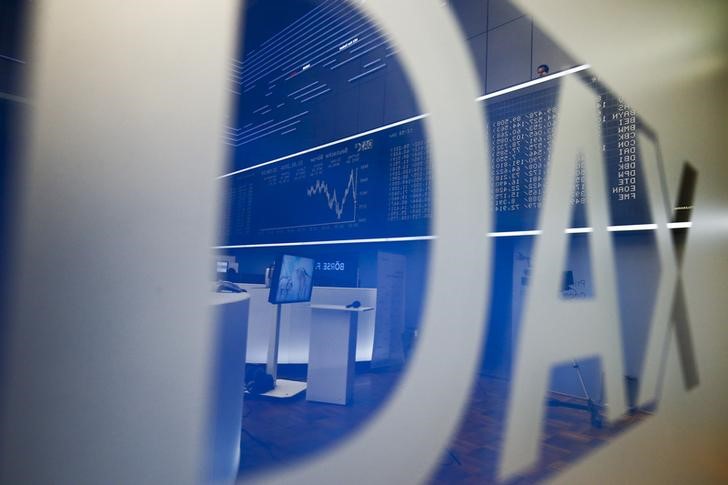* Graphic: World FX rates in 2018 http://tmsnrt.rs/2egbfVh
By Ritvik Carvalho
LONDON, Sept 28 (Reuters) - Italy's government bonds, European stock markets and the euro were hit hard on Friday after Rome agreed to set a higher than expected budget deficit target that could put it on a collision course with Brussels.
The Italian government on Thursday targeted a budget deficit of 2.4 percent of gross domestic product (GDP) for the next three years, marking a victory for party chiefs over economy minister Giovanni Tria, an unaffiliated technocrat deficit, though within the prescribed EU limit of 3 percent of GDP, is a concern for investors who fear the anti-establishment government is not committed to tackling its huge debt load. Italy's debt-to-GDP ratio stands at about 130 percent, the highest in the euro zone behind Greece.
European shares fell 0.8 percent, with shares in Italian banks .SX7E - whose big sovereign bond portfolios make them sensitive to political risk - bearing the brunt of selling pressure. Shares in Italian banks .FTIT8300 were down 7.5 percent. .EU
Italy's FTSE MIB .FTSEMIB fell 4 percent, while Germany's DAX .GDAXI fell by 1.5 percent.
Italian government bonds were set for their worst day since a brutal May 29 sell off, up 34-42 basis points across the curve. GVD/EUR
The euro fell to an 11-day low of $1.1615 EUR=EBS after suffering its worst one-day decline in seven weeks on Thursday.
"The 2.4 percent target is not consistent with an improvement in the structural budget balance and hence they seem to be on a collision course with Brussels," said ING strategist Martin van Vliet.
"For me the key issue is what they assume on the budget beyond 2019. They are seemingly leaving the path of fiscal consolidation and that may not sit well with ratings agencies."
The falls in European shares left MSCI's All-Country World Index .MIWD00000PUS down 0.3 percent on the day and set for its firstly weekly loss since early September.
In Asia earlier, Japan's Nikkei raced to a 27-year high on the back of a lower yen and improved prospects for corporate earnings.
Japan's Nikkei stock index .N225 rose as high as 24,286.10 points, its strongest since November 1991, on renewed optimism over the global economy and hopes of a boost to exporters' earnings from a weaker yen. It was last up 1.5 percent.
Shares in China were higher ahead of a week-long national holiday. Blue-chips stocks .CSI300 gained 0.8 percent and the country's main Shanghai Composite index .SSEC was up 0.7 percent.
Elsewhere in Asia, MSCI's broadest index of Asia-Pacific shares outside Japan .MIAPJ0000PUS was little changed, with a 0.05 percent decline.
Australian shares .AXJO rose 0.4 percent, while Seoul's Kospi .KS11 gave up 0.5 percent after hitting three-month highs on Thursday.
S&P E-mini futures ESc1 crept lower on Friday, down 0.1 percent after gains on Wall Street overnight. .N
KING DOLLAR REIGNS
The dollar index .DXY , which tracks the U.S. currency against a basket of six major rivals, was up 0.4 percent at 95.292 on Friday, hitting its highest levels since Sept. 10 FRX/
After the Federal Reserve raised interest rates on Wednesday - the third increase this year - Fed Chair Jerome Powell said that the United States does not face a large chance of a recession in the next two years and the central bank plans to keep raising rates gradually. Citi analysts cautioned that not all data was reassuring.
"The Citi US Economic Surprise Index has been pushed into negative territory by disappointing housing data in the United States," they wrote.
"The latest data confirms that the housing market continues to be less than ideal. Pending home sales, a leading indicator, declined to the lowest level in seven months."
U.S. Treasury yields hit their lowest in ten days. The yield on benchmark 10-year Treasury notes US10YT=RR was at 3.0280 percent on Friday, against Thursday's U.S. close of 3.055 percent.
U.S. crude oil CLc1 was flat at $72.15 a barrel and Brent crude LCOc1 was up half a percent at $82.04.
Gold advanced slightly after tumbling 1 percent on Thursday on strength in the U.S. dollar, which made bullion more expensive for buyers using other currencies.
Spot gold XAU= was up 0.08 percent at $1,183.24 an ounce. GOL/
<^^^^^^^^^^^^^^^^^^^^^^^^^^^^^^^^^^^^^^^^^^^^^^^^^^^^^^^^^^^ Where next for Italy's debt levels?
https://reut.rs/2KmGDwe
^^^^^^^^^^^^^^^^^^^^^^^^^^^^^^^^^^^^^^^^^^^^^^^^^^^^^^^^^^^>
